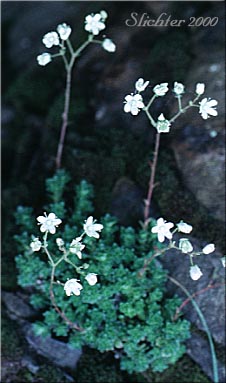 Photo at right
of Saxifraga bronchialis var. vespertina from the Columbia River Gorge......Spring
1992. Note the wide leaves with rounded tips.
Photo at right
of Saxifraga bronchialis var. vespertina from the Columbia River Gorge......Spring
1992. Note the wide leaves with rounded tips.
Spotted saxifrage is a tufted, cushion forming perennial. The leaves are rigid and closely crowded together, giving the plant a moss-like appearance. The leaves are linear-lanceolate to oblong or spatulate, 5-15 mm long, and persist for may years. The surface of the leaves are usually smooth. The flowering stems range from 5-13 cm high with several smaller, sessile and spiny leaves. The upper stem is generally glandular-hairy. As the cushion expands outward, the inner portion often dies, creating separate clones.The inflorescence is a flat-topped cluster. The 5 petals are white, 5-8 mm long, with distinctive red or purple dots above the middle, and yellow-orange spots near the base. The petals are oblong to oblong-oval in shape. The calyx is saucer-shaped with the lobes or sepals triangular to oval in shape, spreading, and from 1.5-2.5 mm long. The 5 stamens are opposite to the sepals.
Variety austromontana- The leaves are narrowly lanceolate to linear with pointed tips. They are usually over 4 times as long as wide. Found from British Columbia south through the Cascades to Mt. Rainier and east to the Rocky Mts. where it may be found south to New Mexico. Within the Pacific Northwest, it may also be found in northeastern Oregon.
Variety vespertina- The leaves are oblong or spatulate, or occasionally 3-lobed at the tip. The leaves are not more than 4 times as long as broad. The leaf tips are blunt to obtuse. Found in the Columbia River Gorge, in the Cascades north to Mt. Rainier and south in Oregon, on Mt. Baldy in the Olympic Mts and at Saddle Mt. in the Coast Range of Oregon.
Spotted saxifrage may be found in rock crevices, on cliffs, on rock slides and alpine scree.
Spotted saxifrage may be found from Alaska south through the Cascade and Olympic Mts to northern Oregon, and in the Blue and Wallowa Mts. of southeastern Washington and northeastern Oregon. It may be found eastward to Greenland, and south of the Arctic, it may be found south through the Rocky Mts. to New Mexico.